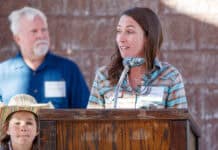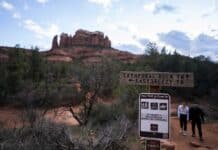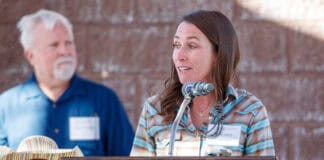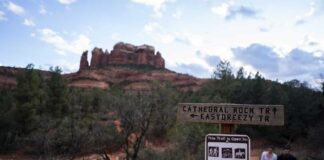
The second half of the Thursday, Feb. 1 meeting of the Verde Valley Yavapai Democrats, hosting incumbent Yavapai County District 3 Supervisor Donna Michaels and her Democratic primary challenger Nikki Check, was a 30-minute question and answer session of questions submitted by the audience.
Yavapai County District 3
This is the second part of a two-part story on the Feb. 1 Democratic mixer with candidates Nikki Check and Donna Michaels.
For the first part of the story click here.
◼ “Given the narrow victory in the last election, what makes you electable?”
“In order to win a primary you have to be comfortable in your progressive base but then to be able to show a middle road,” Check said, and repeated her previous comments about her 2016 race. “I have some conservative sides to me. Fiscal responsibility is one [of] the most important things and it’s important to voters [and] to District 3.
“The thing that makes me most electable is my willingness to show up, to listen, be thoughtful, be reasonable and to integrate the perspectives I see out there.”
Check’s call for fiscal responsibility mirrored Michaels’ campaign website, which lists under her positions, “The budget should be balanced and budgetary decisions based on the most conservative actions possible.”
“I’m kind of a covey leadership person,” Michaels said. “You always start with the goal in mind and to speak to that. My record stands in working with diverse populations and presently working with some of our legislators who have agreed to come on board to change and create legislation to regulate site fees for our families, often seniors, many not able to make the move for physical reasons or financial reasons from their manufactured homes. Nobody’s paid attention to this.”
In a Facebook post, Michaels stated that she was communicating the concerns raised during a January meeting of the Cottonwood based group Manufactured Home Residents for Change on the matter to state government officials.
“I’m a great advocate for cattle ranchers and have been for some time, even when I didn’t eat meat,” Michaels said, citing a September meeting between the Yavapai Cattle Growers Association and the board of supervisors.
Both candidates stated that District 3 pays more in taxes than it receives from Yavapai County. Check’s proposed solution to the issue was presenting a unified voice from the Verde Valley.
“This ‘dis-equity’ that we do experience from one side of the mountain to the other is a process,” Michaels said. “I worked eight, maybe 10 years … [with] the college board, telling every time like to get the chance that 40% of our tax dollars are going over to the other side of the mountain and what do we have to show in programs? … Now what we need to force them to do is fill it with meaningful programs.”
◼ A resident asked the candidates for their vision for the district and brought up the issue of inequity in county spending, asking what can voters expect with regards to roads and water “and will we get our share?”
Michaels cited a proclamation unanimously approved on May 18, 2022, by the Yavapai County Board of Supervisors calling for the state legislature to “provide water certainty to rural Arizona by passing legislation on rural management areas in the 2022 legislative session.”
The Prescott side of Yavapai County can go for federal funding on roadway projects “because they have more people,” Michaels said. “So let’s get these young families here. Let’s have a bigger family. Let’s raise our census [count] and get the money we deserve.”
“There’s another reason that we won’t be getting federal dollars invested in the Verde Valley anytime soon and that was because when Michaels took office, she voted against the Verde Connect, which was already shovel-ready,” Check said in response. “The contract had already been signed with the federal government, which left Yavapai County in breach of contract.
“It puts you not only at the bottom of the list, but it gives you a mark on the list as well. Don’t expect any federal dollars. It’s wonderful to hear that our relationship with [the] Arizona Department of Transportation has been touched up and good job on getting that roundabout.”
The Yavapai County Board of Supervisors voted 3-1 on Nov. 18, 2020, to nix plans for the Verde Connect project, citing high costs estimated to be nearly twice as much as the $25 million grant issued by the Better Utilizing Investments to Leverage Development Grant from the U.S. Department of Transportation. Due to technical issues at the meeting making the board’s motion unclear, the supervisors brought it back in December so it could be properly witnessed for the public record, but the 3-2 vote in support was in limbo because two of the three supporters were leaving office and their incoming replacements, Michaels and District 2 Supervisor James Gregory, stated during their campaigns that they would oppose it. The new board unanimously rejected it at Michaels’ first meeting on Jan. 6, 2021.
In her campaign literature, Michaels listed her opposition to the project under her accomplishments, crediting it with “saving taxpayers ultimately up to $100 million.”
However, the engineers’ estimate was about $35 million to $40 million for the full project, with $25 million to be paid by the federal government and $10 million to $15 million to be paid by Yavapai County, less than the $100 million she cited.
“I have to make a criticism also of Michaels, because the water proclamation the county put out was news to the mayors,” Check said in reference to the proclamation cited by Michaels. “I’ve spoken with several mayors who were upset when they saw that water proclamation came out because they didn’t have any say, they didn’t have any invitation into the process of that.”
◼ If you had a list of priorities for discretionary funding, what would they be for District 3?
“As a policymaker, you shouldn’t have too many pet projects,” Check said. “But I do have at least one and that is to focus on a conservation plan for Yavapai County, similar to the one that Pima County put together. I think it’s the right time to really consider the impacts of development now, before it gets any further down the line and when I say conservation I mean for water for the Verde River, wildlife corridors and for open space.”
Michaels, cited the Yavapai Cattle Growers’ memorandum and lobbying for OHV regulations as actions already taken for conservation.
“What I won’t do, however, is pander; I won’t tell you ever if there’s no money, that there is; I won’t do that,” Michaels said in response. “When there’s no money, there’s no money. When you look at your checkbook and you want that shiny car, but you can’t afford it. You don’t write the check anyway. It’s irresponsible and I could not do it. Do I want it increased? You bet and we’re working on that formula right now.”
◼ How would you judge zoning decisions by YavapaiCounty supervisors?
Check used the moment to praise the board of supervisors and Michaels for voting down the Yavapai Ranch, a proposed development in the upper Big Chino near the Verde River headwaters, and proceeded to call for balancing growth and conservation.
Michaels cited working with federal elected officials to get the viticulture accreditation in the Verde Valley and recent discussions between local viticulture industry leaders.
Michaels wrote in a Jan. 11 recent activities report to a nonprofit in the Village of Oak Creek that she “facilitated a high-level meeting involving the Forest Service, ADEQ and key stakeholders to address concerns related to prescribed burns. The outcome? A commitment from the Forest Service to reassess the timing of these prescribed burns, minimizing potential damage to vineyards during their critical harvesting season and public health.”
Michaels reiterated that during the event, stating “to their credit that’s not going to happen again.”
However, there are currently no such formal agreements in place with regard to this issue according to state and federal officials.
“She met with myself and the forest supervisor to talk about concerns, I don’t consider either of us high level,” District Ranger Amy Tinderholt said on Jan. 19. “We had a conversation with Michaels [in early November] and a local vineyard owner as well as a representative from the state who works with viticulturalists and talking about their concern after we had quite a bit of smoke impacts this fall.”
According to Tinderholt, the Arizona Department of Forestry and Fire Management is considering a meeting to talk about community concerns about smoke with regards to prescribed fire.
“Anything that would change would likely come out of a larger scale conversation like that,” Tinderholt said.
“This will likely be a topic at our joint DFFM and [the] Arizona Department of Environmental Quality proposed Smoke Summit at the end of the month,” DFFM spokeswoman Tiffany Davila stated in an email. Whether any local agreements regarding the timing of controlled burns in the Verde Valley, Davila stated, “To my knowledge and everyone else’s I spoke to in our Chino office, including our Agency Prescribed Fire boss — no.”




















